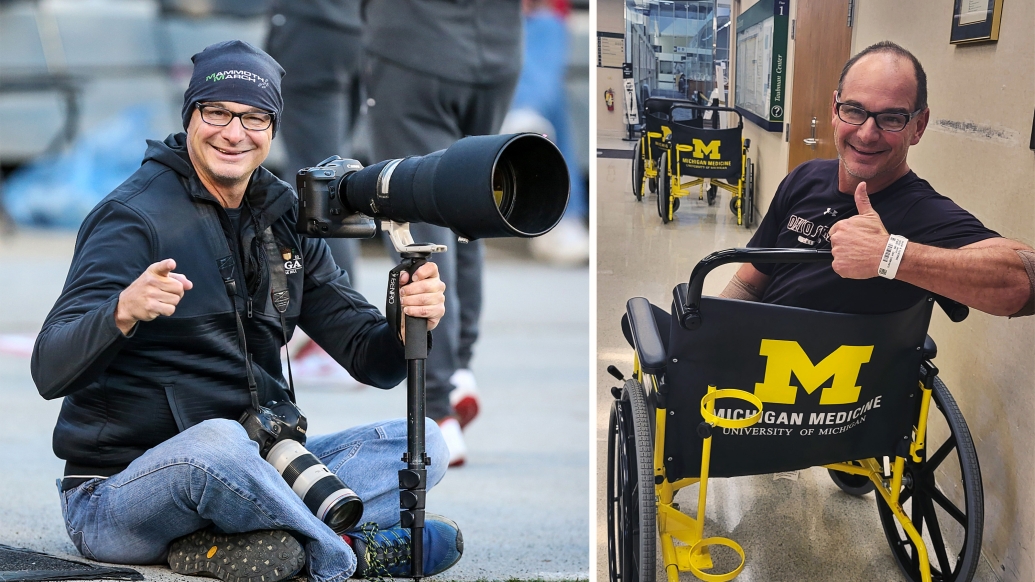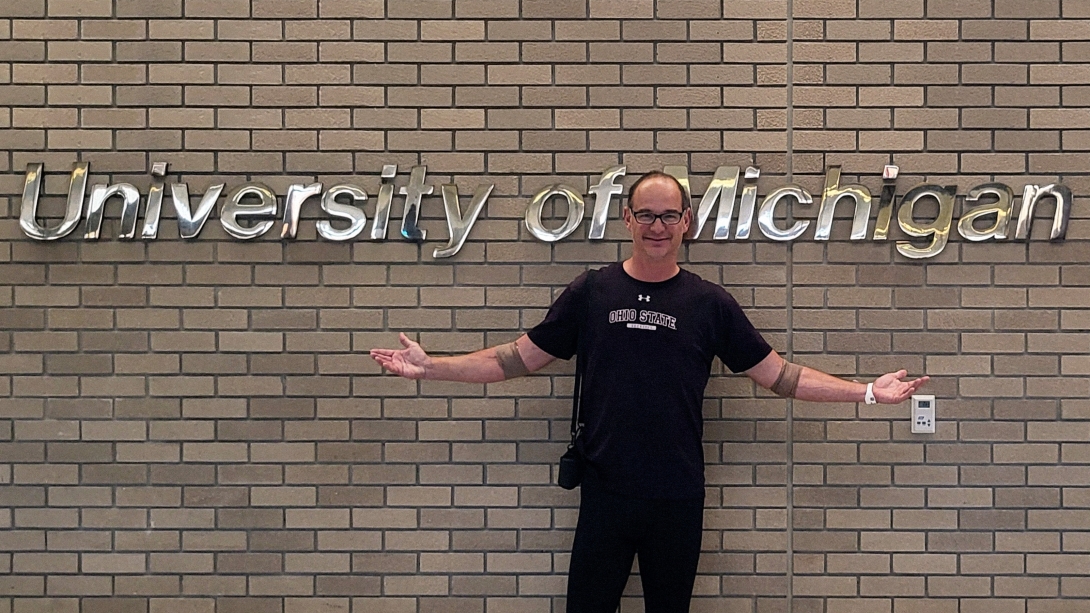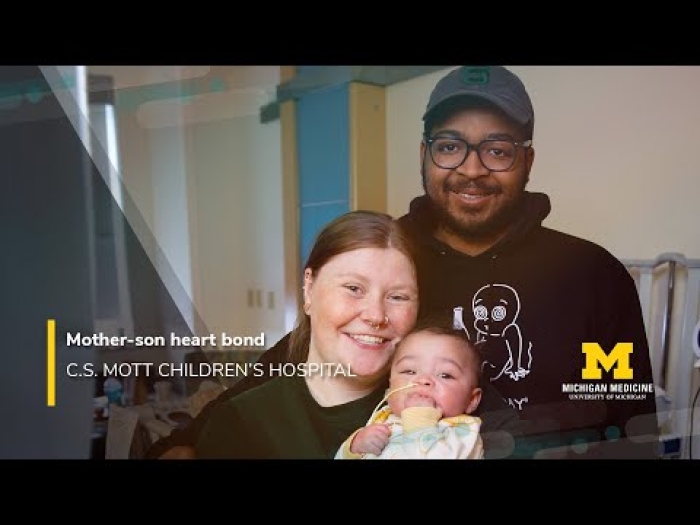Medical teams acted quickly to transport the journalist after he reported symptoms at Michigan Stadium
9:33 AM
Author |

An Ohio-based sports photographer is recovering safely at home — and feeling somewhat victorious, despite the Buckeye loss — after having a heart attack at the conclusion of “The Game”.
“We all have jobs; they got theirs done, and now I’m here and able to talk about it,” said Aaron Josefczyk, 54, who hails from the Cleveland area.
“Michigan saved my life.”
"The Game"
As Michigan fans stormed the field, celebrating the team’s third consecutive win against Ohio State, Josefczyk walked back into the media work room to file his photos for United Press International.
Soon after, he went to retrieve his remaining equipment from the field.
“I got a bit of tightness in the middle of my chest,” Josefczyk said.
“I couldn’t breathe deeply. I grabbed my lens and struggled to get up the tunnel. Eventually I got so hot that I got rid of some clothes and told security I was going to get some fresh air outside.”
Josefczyk, then feeling faint, got the attention of an usher who alerted paramedics staffing a golf cart ambulance.
They brought him to the Medical Station staffed by doctors from University of Michigan Health’s Department of Emergency Medicine and paramedics and nurses from Huron Valley Ambulance.
“Our team performed an electrocardiogram and immediately identified him as having an acute inferior wall myocardial infarction, or heart attack,” said Mark J. Lowell, M.D., emergency physician, medical director of Survival Flight at U-M Health and medical director of the Medical Station.
The medical team rushed Josefczyk into an ambulance that weaved through postgame traffic and headed toward U-M Health.
“I was in disbelief,” he said. “I didn’t freak out. I’ve always been kind of a goofy guy, but I could see they were very urgent.”
The hospital
At the door of the emergency department, a group led by emergency physician Frederick Korley, M.D., Ph.D., stood waiting for Josefczyk.
Lowell’s alert activated the hospital’s internal process for handling heart attacks, which involved emergency care, as well as interventional cardiology.
“We greeted Mr. Josefczyk and got another EKG and learned more about his history,” said Michelle Feeney, M.D., emergency medicine resident at U-M Health.
“We agreed it was definitely a heart attack and prepared for cardiology to take him to the cath lab for a cardiac catheterization.”
Before he was taken to the U-M Health Frankel Cardiovascular Center, Josefczyk, who was wearing a previously hidden Ohio State shirt, noticed a small detail. Feeney, who graduated from OSU’s medical school in 2020, wore a “block O” pin on her work lanyard.
“I think I got a couple comments about my shirt there, and [Dr. Feeney] leaned over to me and said, ‘I got your back,’ which was the greatest thing,” Josefczyk said.
In the “cath lab”, interventional cardiologist Michael Grossman, M.D., and senior cardiology fellow Rayan Rachwan, M.D., threaded a catheter through the photographer’s wrist.
They opened his occluded right coronary artery and placed two stents that served as scaffolding to keep Josefczyk’s vessel open.
“Fortunately, Mr. Josefczyk did not develop any complications related to inferior myocardial infarction that would increase his risk of death, such as cardiogenic shock,” said Grossman, who is also a clinical professor of internal medicine-cardiology at U-M Medical School.
“The immediate recognition of a medical emergency at the Big House and rapid transport to the emergency department allowed us to expedite care and get the blocked vessel open quickly. Our entire organization practices the management of patients with a heart attack regularly. To use a well-known Michigan football phrase, it’s all about ‘The Team.’”
The recovery
Four days later, Josefczyk got a ride back to Ohio.
As he recovers and looks to address some additional issues identified on the other side of his heart, Josefczyk hopes to progress slowly.
“I still get a little paranoid any time I feel something in my chest, but it’s probably a good thing” he said.
“I have become a nutrition expert and am watching what I’m eating. I’m also trying to keep my heart rate down but hope to get back to exercise.”
On Facebook, hundreds of his family members and friends shared messages of support. The sentiments, Josefczyk says, were overwhelming.
“You do not realize how many people you have in your life until you do,” he wrote on Facebook.
The positive result, Feeney says, starts with a multidisciplinary group of health care workers following a careful plan.
“It’s a marathon to think of all of the people involved in his care to get him into the cath lab so quickly,” she said.
“Everyone has a check list of what they need to do. One person missing in the chain would have affected his care.”

Josefczyk hopes to return to Ann Arbor in two years to photograph “The Game” once again — with newfound appreciation for the rival team.
“As much as we all give that team up North a lot of hate, their group of medical professionals saved my life,” he said.
“I cannot say enough about the staff here at Michigan. I would love to visit and thank the hospital and stadium staff in person.”
Special thanks to Kevin Argentieri, M.D., and Tim Sabados, R.N., EMT-P, who accompanied the HVA crew and Josefczyk to the hospital.
Sign up for Health Lab newsletters today. Get medical tips from top experts and learn about new scientific discoveries every week by subscribing to Health Lab’s two newsletters, Health & Wellness and Research & Innovation.
Sign up for the Health Lab Podcast: Add us on Spotify, Apple Podcasts or wherever you get you listen to your favorite shows.

Explore a variety of healthcare news & stories by visiting the Health Lab home page for more articles.

Department of Communication at Michigan Medicine
Want top health & research news weekly? Sign up for Health Lab’s newsletters today!





